
Turkey & Western Georgia
Friday, May 22, 1998
I left work a bit early and headed off at 4:00. I started down the road out of Tbilisi only to find my way blocked as the road was closed for a big parade to be held next Tuesday. I crossed the river and tried to find the best alternative route but got stuck in traffic and couldnít find the bridge I was looking for. After a half hour of wandering around Tbilisi I found the bridge and was on my way to Borjomi, 165 kilometers west of Tbilisi.
Arriving in the village of Borjomi I quickly found the "guest house" Likani where I would stay. A government security guard showed me where to park and escorted me to the proper building to register. Likani has several buildings that are sort of a cross between a dorm and a hotel. Mine had three floors with 20 rooms on each floor, drab rooms but clean and with private baths. Each floor also has a meeting room with a TV. Borjomi is famous in Georgia for its mineral water and has been a resort area for many years. During communist times the Likani was a moderately exclusive resort for government officials. I was late for dinner so I was escorted to a fine dining building with big windows, many workers and minimal quantities of mediocre food.
The grounds are beautiful, with many paths and gardens spread out along the river.
Saturday, May 23
 |
| Church in Borjomi Nature Preserve |
After a breakfast of bread, cheese, yogurt and cream of wheat I asked how to find the Borjomi Nature Preserve. The manager of the hotel said he had a friend who was heading towards the headquarter who would show me the way. Unfortunately the headquarters was closed, so the man found someone else who could show me how to get to the preserve. He spoke no English, but he told me to turn on a little dirt road that started winding through the mud up a hill. I was wondering what I had gotten myself into but glad to have jeep when suddenly the road widened, a bell rang and there was a fine old church tower and next to it a very old church. A bearded old man appeared from out of the woods and invited us to explore.
Then we went back to the highway until he showed me another equally muddy old road. This one came out on a fish farm, with a dozen rectangular pools, each with fish of the same size. Some men were catching the fish in nets.
The next road ended at a grassy clearing in the a ravine surrounded by tall cliffs. My guide pointed to a path that went very steeply through the woods. After ten minutes we came out on another very old stone church. They certainly built churches in out of the way places!
By now it was early afternoon so I took my guide home, offered him some money which he refused and headed for Kutaisi, the second largest city in Georgia. I was ready for some lunch so I stopped at a promising looking café with some tables outside. I went in and asked for a menu. The manager took me into the kitchen and pointed out some mushrooms being cooked and some meat being barbecued and I said fine and went outside and sat down. Then he came and told me to come in and we went to the adjoining room where a big party was going on. The table was covered with food and men were playing the accordion and singing. Nobody spoke any English but they offered me food and were disappointed that I wouldnít drink more than a sip of their wind (I still had a long drive ahead). Eventually a doctor appeared who spoke a little English. He gave me his address, examined by business card and insisted that numerous pictures be taken. After a while I decided that I needed to be on my way, said good-byes, took enough pictures to make everyone happy and tried unsuccessfully to pay for my fine lunch.
I was a bit worried about finding my "hotel" in Kutaisi because all I had was an address and it was just a bread and breakfast in a converted private home. As I entered Kutaisi I asked a couple of people which way, they pointed me down the right road until I came to a square in the center of town. There I asked a security guard which way and he consulted with some men standing around. Then they said, just follow our car and weíll show you. So I followed as we drove very steeply up a narrow cobblestone road, turned several times until suddenly they stopped. A woman looked over the fence and greeted me and I was there.
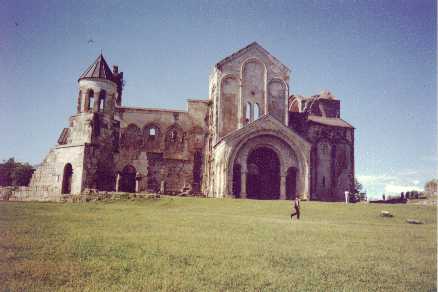 |
| Bagrati Cathedral |
Lali and her husband didnít speak any English but their 14 year old nephew Irakli spoke very well. He showed me to my room, asked what time I wanted dinner and whether I wanted to go see the Bagrati Monastery before dinner. So I got in a car with Laliís son in law Gogita and Irakli and we drove a kilometer or so to the ruins of this grand old twelfth century monastery on a hill overlooking the city. After a large and excellent dinner they asked where I wanted to go tomorrow and offered their services as guides. Besides the nearby attractions they recommended a village 60 km off into the hills. I agreed.
In the evening I rode my bicycle to a nearby park that had several rides. I paid my fifteen cents to ride the big, slow Ferris wheel. Then I returned to sit on a deck in back of the house with fine views of the city. Irakli had gone home and the innkeeper invited her next door neighbor college student to come over. Marina also spoke English and when she heard where we were going the next day asked if she could join the party.
Sunday, May 24
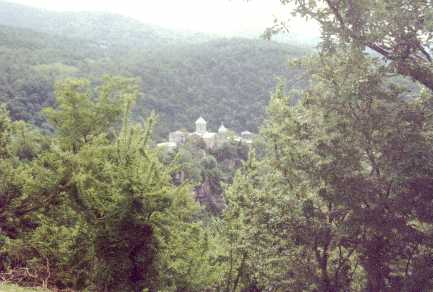 |
| Mozameta Monastery |
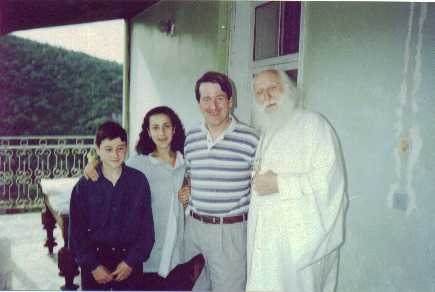 |
| Irakli, Marina, Me and Priest of Mozameta Monastery |
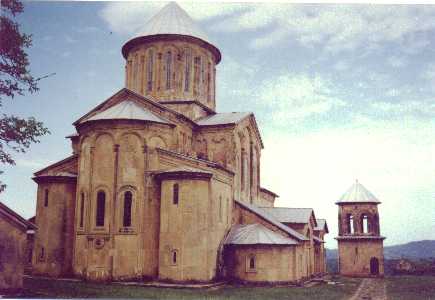 |
| Nikortsminda Cathedral |
I got up for an early breakfast with my guides, then we piled into my car with Gogita driving. Our first stop was the Mozameta Monastery. After a short drive on some very poor roads we came to a train station, drove across the tracks and down very steeply to the gates of a small fourth century monastery built on top of sheer cliffs overlooking a river. A white-bearded priest greeted us and offered wine as he showed us around.
Then we headed on to Gelati Monastery. Gelati is much bigger and included two churches, several houses and an academy. King David ("the builder") was responsible for the construction of this and many of the twelfth century churches.
From there, the road was in very poor condition as it wound its way through the hills to a village called Nicorcminda which means Holy Place of Nicholas. There, after visits to two more fine old churches with frescoes on the ceiling and walls we went to the house of Irakliís grandfather. It was a stone house with electricity but no running water inside. Outside, under an overhanging roof was a shed that had the running water. Grandfather had a garden of about a half acre growing corn and other vegetables. He also had many fruit trees and grapes and chickens. He made the grapes into wine. So for lunch he pulled out a gallon jug of homemade wine and added it, cheese and eggs to the lunch we had brought. He made me drink from a small horn filled with wine (maybe two glasses worth). The thing about the horn is that once it is filled with wine you canít put it down because it doesnít have a flat bottom! He tried to convince us to stay the night, but Irakli had school the next morning and I wanted to be on my way. Besides he had no telephone so there was no way to tell the people in Kutaisi that we were staying. So he insisted that I return in the summer.
Back in Kutaisi we had been joined at dinner by a British couple with a Georgian guide who were spending a week in Georgia. We had another delicious and large dinner. It included soup, cheese and bread, then tomatoes (very good ones) and cucumbers, barbecued pork and very small new potatoes.
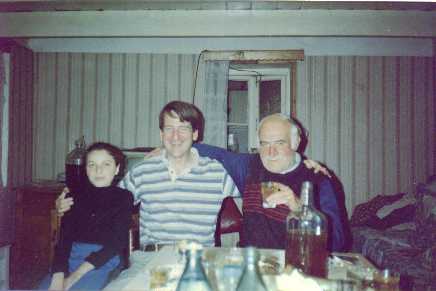 |
| Marina, Me and David (Irakli's Grandfather) |
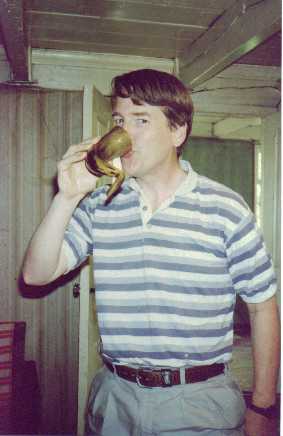 |
| Drinking wine from the horn, which you can't put down until it is empty |
Monday, May 25
Off to Batumi and the Black Sea. But first, my host showed me how to get to Sataplia, a nature preserve with a huge cave (limestone, I suspect) with the Stalactites and Stalagmites. I paid my 4 lari ($3) for our tour and the ranger hiked over to the cave with us, turned on the dim lights and lead us through the walkway from room to room, across pools and streams. It was impressive. Then he gave me postcards. Nearby were footprints of dinosaurs.
I returned my host to Kutaisi and headed west. The ride was uneventful until after I hit the highway by the Black Sea and was heading South for Batumi when suddenly the car became hard to steer and I had a flat tire. So I got out and started looking for the jack. I didnít find one, but I was next to a gas ("Petrol") station so I went and asked the four teenagers there if they had a jack I could use to change my tire. They found one and very quickly changed the tire for me. They didnít want to take any money but I insisted on paying 5 Lari ($3.75).
An hour later I entered Batumi and started looking for the hotel. The only problem was that the street the hotel fronted on was closed Ė for the summer I think. So after a little wandering I found the back entrance and happily parked the car. The hotel in Batumi is a real hotel, with several floors and more than a hundred rooms. It has one big dining room and several cafes and bars. It caters to tourists, mostly from elsewhere in Georgia who have come to the Black Sea to vacation. It is still called the Intourist Hotel.
Batumi is Georgiaís second largest port and is the biggest city in the "Autonomous Adjarian Republic", a part of Georgia that has more independence than other regions but is still part of Georgia. When I entered Adjaria, there was a police roadblock and a narrow path for cars to zigzag through stone barriers. But nobody asked for an ID or anything, they just watched carefully.
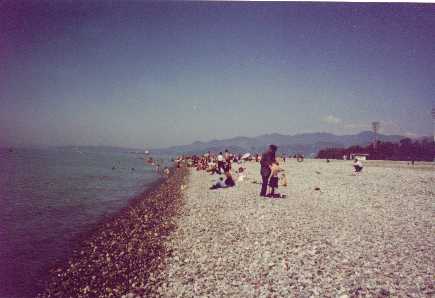 |
| Black Sea Beach in Batumi |
After settling into the hotel I took my bike out of the car and rode down the tiled path that follows the beach. There were many people out walking and dozens of small cafes and street vendors. Everyone seemed to be relaxing and having a fine time. Then I rode on some of the blocked off streets. I found out that because tomorrow was independence day the symphony would be giving an evening concert. I rode the Ferris wheel by the beach. It was a warm sunny day.
After a light dinner in a café I wandered over to the concert site, a huge square in the middle of the city. A stage had been set up at one end. A hundred or so dignitaries sat near the stage while a couple thousand spectators milled around the square. Some listened attentively to the music while others visited with friends. There was a wide range of ages, from senior citizens, to parents with young kids to teenagers. It could have been a Boston Pops performance, from the overture to Carmen to the Beatles, though there were many pieces I did not recognize. The conductor occasionally encouraged the audience to clap in time to the music which many happily did. Then there was a pause while a chorus of 125 joined the orchestra and local opera stars went to the microphone. Everyone seemed to recognize the performers.
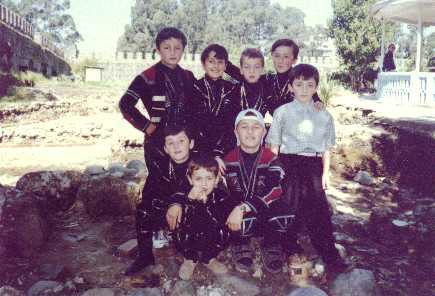 |
| Boys reheasing skit for Independence Day in Gonio Fortress |
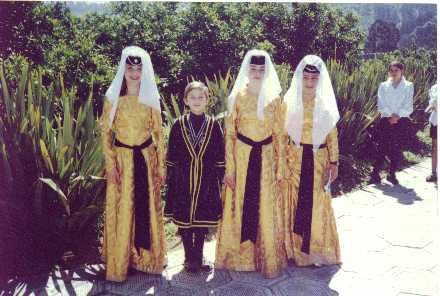 |
| Girls reheasing |
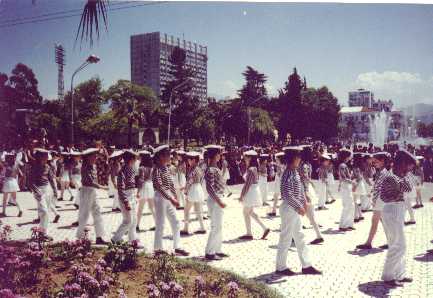 |
| Performance in Batumi |
Tuesday, May 26
I got a prompt start heading for the Turkish border, fifteen kilometers down the road. First I stopped to get my tire repaired. While I was waiting I saw a very old and very large stone wall. I went in and discovered people growing grapes and vegetables. It was obviously an old fortress with towers in the corners. Near the center was a sort of a stage and boys dressed in black with many decorations and girls dressed in gold were rehearsing for a presentation. I took a couple of pictures and then everyone insisted that they get their picture taken. Later I discovered that this fortress was called Gonio.
I was soon at the Turkish border. First I went through Georgia customs with no problem. Then there were Russian border guards (still in Georgia) who asked for my passport and visa. They didnít like my Georgia visa and after a half hour or so of discussion told me to go back to Batumi and get a different visa. I went back and found the office closed for the holiday, so I spent a relaxed afternoon by the beach in Batumi.
For the holiday there were children presenting folk dances from all over. I would ride my bike and see a group of people and in the middle would be a performance. It seemed to be a very festive day, with many people out enjoying the beach, the fine day and the holiday.
Wednesday, May 27
I went to the Office of the Ministry of Foreign Affairs to get my visa. The official was a little late arriving, but then listened to my story and explained that my visa was a new kind and that the border guards were not yet accustomed to it. He would send word to them, explaining that my visa was a fine one and that I should have no problem, but that I should wait an hour before heading for the border to make sure that the guards would get the word.
So I headed for the border again, cleared customs and met the same border guards. They greeted me pleasantly and asked if I now had my visa. After about an hour of discussions intermixed with waits while they consulted with other officials, during which they told me several times that the easiest thing would be to go back to Batumi and get the visa, they eventually let me leave Georgia as long as I agreed to get a regular visa in Trabzon, Turkey before I returned. Then I entered the Turkish side of the border crossing. They were very well organized as I went from station to station, getting the Turkish visa, ($45), papers for the car ($20), police approval, customs approval, a vacation map of Turkey, computer data entry and Iím not sure what else. Finally I was on my way.
After a half hour or so of following the Black Sea coast on a road in very poor condition but being repaired, I arrived at a town where I could get some lunch. I was immediately struck by the way the stores were filled with goods in ways that Georgian stores are not. In Georgia if you want to buy almost anything you can usually find it, but typically the store will have samples under the counter or on a shelf behind the counter and they will not have much variety. In Turkey the stores could have been in the West if they had prices marked on more of the items. I went to the bank to exchange some money and it looked like a modern American bank. The only real difference was that they offered me a small cup of tea with my money!
I found lunch at a kebab shop. In Turkey, kebabs are any meat cut into small pieces regardless of how they are served. Lunch was quick and good and I headed for Trabzon.
The highway was often right next to the Black Sea, much like the Pacific Coast Highway. The road was good and I could make good time except that every five miles there seemed to be another town with traffic lights and low speed limits.
Trabzon, Turkey, Wednesday and Thursday, May 27-28
In Trabzon I found my hotel without much trouble (the map in my guidebook was useless but when I asked directions they were very good). The man at the counter explained that they had no vacant single rooms but that if I wanted to pay for a double they had some. So I agreed to pay $16 per night and it turned out to be a fine hotel. Trabzon is almost the same size as Tbilisi, with just over a million, but it has a much larger downtown. In Tbilisi, where ever you go you see big buildings next to small ones, houses next to office buildings. The whole city is fairly heavily developed, but it does not vary much between the central city and more outlying areas. Trabzon is more like a western city, with a very concentrated downtown with hotels, stores and offices (mostly stores).
The streets are narrow and most of the stores are small but not tiny. I didnít see department stores but there was every kind of store imaginable. There were lots of people on the streets, well dressed and looking busy.
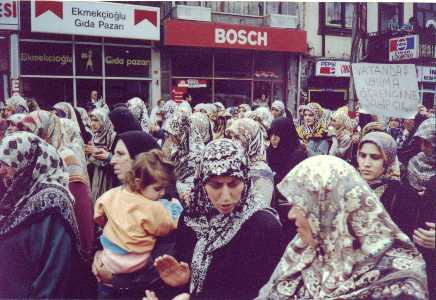 |
| Protest March in Trabzon |
School children all wore uniforms. Elementary school kids had shirts and pants that were color coordinated according to the school they attend. High school students wore blazers and ties with white shirts and dark pants.
Turks appearance varies much more than Georgians. All Georgians have black (or gray) hair and light complexions. Other nationalities here also have dark hair but darker complexions. In Turkey there arenít many blondes, but I was struck by the variety of people I saw. Very few women were working in stores or restaurants. Some women covered their heads but most did not.
Tea was served everywhere. Young men delivered tea in small glass cups on silver trays. At the bank, the travel service, hotel, stores tea was delivered. No office seems to make their own tea, they always have someone deliver it.
There were lots of boys offering to shine shoes and some offering to weigh you on their scales, but very few beggars.
I went to St. Sophiaís, a church from the sixth century that had been converted to a mosque and then back to a church. But otherwise there werenít many tourist sites. I was happy exploring the downtown.
I visited the Georgian Consulate where a friendly official gave me a 14 day visa to get back into Georgia. He was quick and didnít charge me anything. I felt better about getting home to Tbilisi.
Friday, May 28
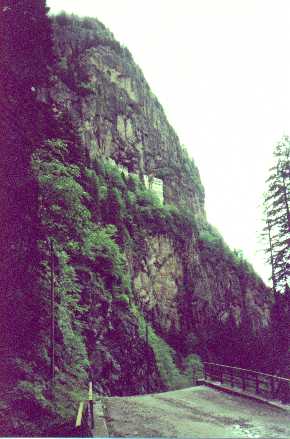 |
| Sumela Monastery |
I signed up for a van trip to Sumela Monastery 40 km SW of Trabzon. At 10:00 I joined two Englishman and women from Canada and Japan at a Trabzon travel agency and we got in a van and headed for the Monastery. It was built on the side of a cliff in the 9th century. It had dozens of rooms and fine frescoes in the chapel. Iíll send pictures after I get my new scanner. The nuns had to stay in a separate compound a few hundred meters away. Apparently the various invaders all tolerated the monks until the 1920ís when the Turks and the Greeks made a trade and sent each others nationals back to their ancestral homeland. I enjoyed the trip and talking with two of the participants who were planning to spend a week in Georgia.
After lunch at a small restaurant we headed back to Trabzon and I got in my car and drove to Uzungol. The guidebook rightly says it is "a pristine trout filled lake hemmed in by steep fir-packed mountains". My guidebook recommended a small hotel (12 rooms) near the lake. I found it and the owner walked over from next door. He didnít speak any English but he communicated that the price including breakfast would be $12. He telephoned his son who did speak some English just to see if I had any questions then he walked down the road with me to a fine restaurant. We had tea together then I went for a short walk to the end of the lake. I didnít go far because it was raining lightly. I returned to the restaurant for a fine dinner including trout from their own fish farm and lots of other food.
Saturday, May 29
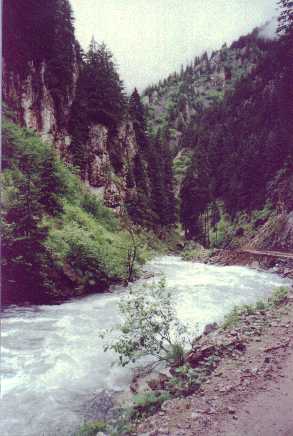 |
| River Above Uzongol Lake |
After an early breakfast at the hotel, I got on my bike and started riding up the road following the river that empties into Uzungol Lake. It was a dirt road and was flooded in places, but a spectacular place. I would call it a gorge, but it continued for many miles as the river worked its way up toward the mountain pass. I turned around after an hour because I wanted to spend the night in Kutaisi and not spend time looking for a new hotel.
The drive to Kutaisi was long but uneventful. The border crossing took only forty-five minutes, mostly on the Turkish side as I again went from one station to the next. The Russian soldiers gave me no trouble with my new visa and I was on my way. I was glad to be back in a country where I knew enough of the language to manage the essentials of life. Though Turkey has more restaurants than Georgia so I made sure to have lunch before I got to Georgia!
I made it to Kutaisi at 7:30 and the Lali greeted me like a long lost friend. She made me a fine dinner and I went to bed early at least by Georgian standards where nobody ever seems to go to bed before midnight.
Sunday, May 30
Home again! Three and a half hours with only two stops: One to buy some wicker baskets filled with cherries and strawberries (delicious) and one to buy a hammock for my balcony ($8).